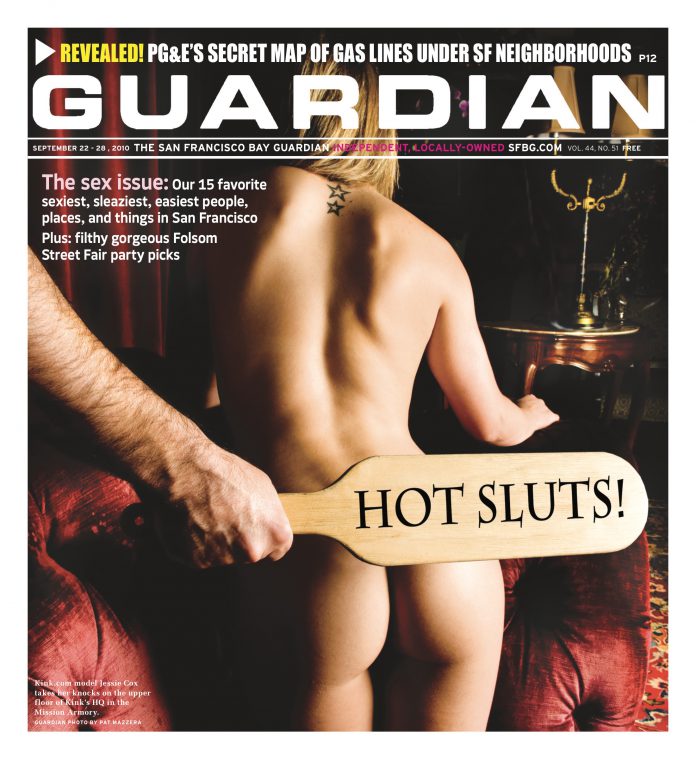marke@sfbg.com
>>CLICK HERE FOR OUR INTERVIEW WITH JAMES FRANCO
Let’s get this out of the way right off the bat: The true “howl” in Rob Epstein and Jeffrey Friedman’s breezy bio-pic Howl is that of the ghost of Beat poet and queer countercultural icon Allen Ginsberg, patting his Buddha belly in the clouds and roaring at his good fortune to be portrayed by James Franco. Eat Pray Love‘s Elizabeth Gilbert may have scored the chick lit holy grail with Julia Roberts, but on the gay-o-meter, being reincarnated in the delectable body of Franco is pretty much to die for.
And Franco’s performance is a wonder, necessarily conveying all the maddening and inspiring elements of the young poet’s personality through subtle facial expressions, eye twinkles, and head cocks. I say necessarily because another thing Franco nails is Ginsberg’s pancake-flat vocal inflection. (Even at 31, Ginsberg came off like a nursing home resident grumbling over mushy latkes.)
There is the evangelical poeticizing and genius marketing. There is the awkward peacocking and needy perviness. And then there is Howl itself. I guess calling this a biopic is misleading. The movie is an amalgamation of styles — imagined interview, courtroom drama, historical flashback, animated fancy — that zeroes in on one particular slice of Ginsberg’s (and the nation’s) development: the celebrated 1957 obscenity trial over Howl the poem that seared Ginsberg, the Beats, and midcentury San Francisco into mainstream consciousness.
Focusing on that trial — City Lights publisher Lawrence Ferlinghetti and bookstore employee Shigeyoshi Murao were busted when Murao sold a copy of the poem to undercover cops — is an excellent strategy, and not just because, historical spoiler alert, Howl‘s victory provides a snappy climax. It also gives the filmmakers a chance to open a window on a particularly tumultuous time.
You get a little Mad Men-type excitement in the spot-on retro set designs and courtroom scenes, which rub old-school 1950s mores against the nascent cultural revolution. (Jon Hamm, Mad Men protagonist, plays the dashing defense lawyer.) You get some freshly presented Beat hagiography, with scenes of strapping young literary princes shaking off their fancy college pedigrees in New York and going, yes, on the road. Jack Kerouac, Neil Cassady, Peter Orlovsky … Beat fetishists will be readjusting their berets with glee.
Unfortunately, you also get long stretches of animated interpretations of the Howl text that seem incongruously imported from the neon-noir ’90s. Which in fact they were — illustrator Eric Drooker collaborated with Ginsberg for 1996’s Illuminated Poems, and he’s the animation designer here. The swirling ayurvedic tornadoes and cosmically copulating bodies, coupled with overly literal imagery (i.e. African American saxophonist during the “Negro streets at dawn” passage) took me back to a lot of bad French Canadian animation festivals.
Mostly though, you get the young Ginsberg. He didn’t attend the obscenity trial, and Howl’s framing device is an imagined interview in his fantastically shabby chic North Beach apartment during the legal proceedings. With Epstein and Friedman (The Times of Harvey Milk) directing, Gus Van Sant (Milk) executive producing, and Franco fresh from Milk himself, the set-up is pretty obvious. Another queer saint is being cinematically canonized. (Ginsberg, of course, was far from Milk on the political scale — his version of gay lib focused on the spiritual journey, not the systematic legal integration. Maybe Howl is meant to be the yang to Milk‘s yin.)
The idea of portraying an openly gay man in the 1950s is juicy — but Howl skews toward sexual yuks, like Neil Cassady’s girlfriend walking in on Ginsberg about to blow him. In this often rushed-feeling film, Ginsberg is allowed only a splash of existential longing before finding some fulfillment with his lifelong companion Orlovsky. But is that really fair, or even brave? After Milk, wouldn’t it be more courageous for this distinguished team to take on a lesbian activist? A transgender groundbreaker? A queer of color? Or even, gasp, the opportunistic, overexposed, NAMBLA-defending, hustler-gorging, radiantly nudist old man that Ginsberg became?
HOWL opens Fri/24 in Bay Area theaters.

